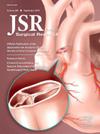Operative Outcomes of Patients With Recurrent Uncomplicated Appendicitis are Similar to Patients With Acute Uncomplicated Appendicitis
IF 1.8
3区 医学
Q2 SURGERY
引用次数: 0
Abstract
Introduction
Nonoperative management (NOM) for uncomplicated acute appendicitis (AA) has been gaining popularity in recent years. As so, more patients present with recurrent AA after a successful past episode of NOM. The aim of this study is to assess the outcomes of patients who underwent appendectomy due to recurrent uncomplicated AA after a successful episode of NOM in the past, and to compare their operative and postoperative course to patients operated for uncomplicated AA during their index admission.
Methods
A retrospective analysis identified patients who underwent appendectomy in our institution between 2017 and 2022. The study group included all consecutive patients who underwent an appendectomy due to recurrent uncomplicated AA after NOM for uncomplicated AA in the past. Their course and outcomes were compared to a cohort of consecutive patients without any prior episodes of AA, who underwent an appendectomy during their index admission.
Results
During the study period, 102 patients underwent an appendectomy due to recurrent uncomplicated AA. This group was compared to 107 consecutive patients without prior episodes of AA, who underwent upfront surgery during their index admission. Analysis demonstrated no significant difference between the groups in the operative approach, resection-technique, overall postoperative complication rates, the use of peritoneal drains, and intraoperative findings. However, length of surgery was significantly shorter in the recurrent AA group than in the upfront appendectomy group (mean ± standard deviation, 34 ± 13.7 versus 50.7 ± 18 min; P < 0.001). Pathology analysis revealed a normal appendix in 11.8% of patients presenting with recurrent AA compared to 1.9% of patients in the upfront surgery group (P = 0.007).
Conclusions
This study demonstrates that surgery for recurrent uncomplicated AA after a successful episode of NOM appears to be safe and comparable to upfront surgery during the index admission for uncomplicated AA.
求助全文
约1分钟内获得全文
求助全文
来源期刊
CiteScore
3.90
自引率
4.50%
发文量
627
审稿时长
138 days
期刊介绍:
The Journal of Surgical Research: Clinical and Laboratory Investigation publishes original articles concerned with clinical and laboratory investigations relevant to surgical practice and teaching. The journal emphasizes reports of clinical investigations or fundamental research bearing directly on surgical management that will be of general interest to a broad range of surgeons and surgical researchers. The articles presented need not have been the products of surgeons or of surgical laboratories.
The Journal of Surgical Research also features review articles and special articles relating to educational, research, or social issues of interest to the academic surgical community.

 求助内容:
求助内容: 应助结果提醒方式:
应助结果提醒方式:


